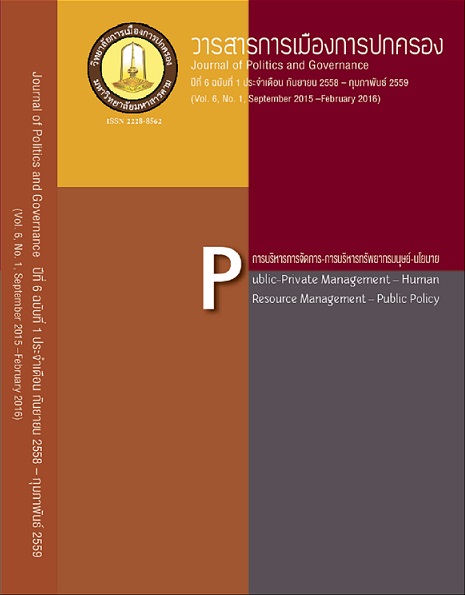Guidelines on Manpower Development to Become Entrepreneurs in Agricultural Career Paths: Learning from Experience of the Developmental Project of the New Generation of Farmers
Main Article Content
Abstract
This qualitative study aims 1) to analyze the manpower crisis in agricultural sector of Thailand, 2) to learnfrom experience of the developmental project of the new generation of farmers, 3) to analyze the paths to become entrepreneurs in agricultural careers and 4) to proposeguidelines on manpower development to become entrepreneurs in agricultural career paths. Data collection were done through techniques of content analysis, interview, focus group, and idea mobilization among 41 concerned people including representatives of national farmers and new generation farmers and a survey of settlements of sufficient economy. Then the data were analyzed by the method of content analysis. Findings revealed that at present the manpower in agricultural sector is declining and therefore affecting food security. Children of farmers do not follow their parents thus to be farmers. Moreover, while Thai society is becoming a society of the elders, the average age of Thai farmers is also getting higher. This suggests that Thai farmers are still of the past generation. This also impacts on knowledge body of farming and farm productivity. From a study on the provision of agricultural education,it was found that in terms of both quality and quantity, the number of graduates in agriculture is reducing and these graduates do not enter agricultural careers. The developmental project of the new generation of farmers is an effort to create opportunity and to develop learning potential to enter agricultural careers. To some extent, it can develop agricultural productivity, upgrade farming occupation and enhance the agricultural manpower because in this project, there is a concrete course to develop participants’ potential under definite collaborative parties and the participants are supported in terms of a productive factor of farming land. The guidelines on manpower development to become agricultural entrepreneurs are composed of 4 ways as follows: 1) that graduates of both levels of CVE and/or HCVE (Certificate/ Higher Certificate of Vocational Education) from agricultural colleges should enter the labor markets of entrepreneurial businesses after their graduations to accumulate experience both in farming and management and capital saving., 2) to follow the career paths according to the guidelines by the developmental project of the new generation of farmers through development of learning potential for careers and support in terms of a productive factors by public and/or private sectors concerned, 3) to design prototypes of agricultural entrepreneurs and mentoring systems, and4) to network agricultural entrepreneurs
Article Details
References
กลุ่มเทคโนโลยีสารสนเทศและการสื่อสารเพื่อการบริหารงานอาชีวศึกษา. (2557). สถิติจำนวนนักศึกษาสาขาเกษตรกรรม ช่วง พ.ศ. 2550-2557. กรุงเทพมหานคร:ศูนย์เทคโนโลยีสารสนเทศและกำลังคนอาชีวศึกษาสำนักงานการอาชีวศึกษา.
กองวิจัยตลาดแรงงาน กรมการจัดหางาน. (2552). รายงานการศึกษา แนวโน้มความต้องการแรงงาน
ในช่วงปี 2553 – 2557. กรุงเทพมหานคร: กระทรวงแรงงาน.
กรมการจัดหางาน กระทรวงแรงงาน. (2558). สถานการณ์การว่างงาน การเลิกจ้างและความต้องการ
แรงงาน (0nline). http://lmi.doe.go.th. 2 เมษายน 2558.
คนางค์ คันธมธุรพจน์. (2558). ความเป็นไปได้ในการจัดอาหารอินทรีย์ให้นักเรียนประถมโรงเรียนเอกชนในกรุงเทพมหนคร. วารสารการเมืองการปกครอง. มหาสารคาม: อภิชาตการพิมพ์.
ปฤษันต์ จันทน์หอม รุ่ง มัลลิกะมาส และอโนทัย พุทธารี. (2554). การขาดแคลนแรงงานไทย: สภาพปัญหา สาเหตุและแนวทางแก้ไข (online). www.senate.go.th/. 8 เมษายน 2557.
ผ่องพรรณ ตรัยมงคลกูล และสุภาพ ฉัตราภรณ์. (2555). การออกแบบการวิจัย. กรุงเทพมหานคร:สำนักพิมพ์มหาวิทยาลัยเกษตรศาสตร์.
วินัย เมฆดำ และคณะ. (2556). สรุปผลการดำเนินงานโครงการสร้างและพัฒนาเกษตรกรรุ่นใหม่ในงานแถลงข่าวความร่วมมือ. กรุงเทพมหานคร: สำนักงานปฏิรูปที่ดินเพื่อการเกษตร.
สันติ ศรีสวนแตง อภิชาติ ใจอารีย์ และคณะ. (2557). รายงานวิจัยฉบับสมบูรณ์ การศึกษาแนวทางการพัฒนาทรัพยากรมนุษย์เพื่ออาชีพเกษตรกรรม. กรุงเทพมหานคร: สำนักงานกองทุนสนับสนุนงานวิจัย.
สำนักงานเลขาธิการสภาการศึกษา. (2553). รายงานการวิจัย เรื่อง การศึกษาความต้องการกำลังคนเพื่อวางแผนการผลิตและการพัฒนากำลังคนของประเทศไทย. กรุงเทพมหานคร: กระทรวงศึกษาธิการ.
สำนักงานคณะกรรมการพัฒนาการเศรษฐกิจและสังคมแห่งชาติ. (2554). แผนพัฒนาเศรษฐกิจและ
สังคมแห่งชาติฉบับที่11 (พ.ศ. 2555-2559). กรุงเทพมหานคร: สานักนายกรัฐมนตรี.สำนักงานสถิติแห่งชาติ. (2555). สรุปผลที่สำคัญ การสำรวจภาวการณ์ทำงานของประชากรพ.ศ.
2554. กรุงเทพมหานคร:สำนักงานสถิติแห่งชาติ.
อภิชาติ ใจอารีย์ ธนันต์ชัย นพแก้ว ทรรศนะ ใจชุ่มชื่น และอรนุช หงษาชาติ. (2551). การเปลี่ยนผ่านกระบวนการทำนา: กรณีศึกษาชุมชนชาวนา ตำบลมหาสวัสดิ์ อำเภอพุทธมณฑล จังหวัดนครปฐม. รายงานการประชุมวิชาการระดับชาติ มหาวิทยาลัยเกษตรศาสตร์ วิทยาเขตกำแพงแสน ครั้งที่ 5 (8 ธันวาคม 2551).
เอกชัย ยุทธชัยวรกุล และคณะ. (2552). รูปแบบกระบวนการเรียนรู้เพื่อสร้างความเชื่อมั่นในการประกอบอาชีพด้านการเกษตร วิทยาลัยเกษตรและเทคโนโลยีสิงห์บุรี. กรุงเทพมหานคร: สำนักงานกองทุนสนับสนุนงานวิจัย (สกว.).
อัมพร มาแสวง. (2555). สมรรถนะและขีดความสามารถของแรงงานภาคเกษตรในอนาคต. วารสารวิชาการปริทัศน์. ปีที่ 20 ฉบับที่ 3 เดือนมีนาคม หน้า 9.
Khunpisuth. (2010). วิกฤติแรงงานภาคเกษตร (online).
http://mangobar.wordpress.com/2010/12/18. 14 มีนาคม 2557.


